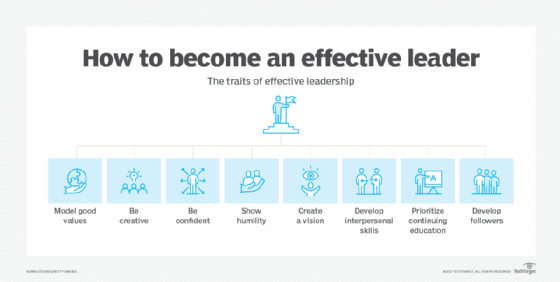leadership skills
What are leadership skills?
Leadership skills are the strengths and abilities individuals demonstrate that help to oversee processes, guide initiatives and steer their employees toward the achievement of goals.
Leadership skills are an essential component in positioning executives to make thoughtful decisions about their organization's mission and goals, and properly allocate resources to achieve those directives. Valuable leadership skills include the ability to delegate, inspire and communicate effectively. Other leadership traits include honesty, confidence, commitment and creativity.
In IT, executives are often required to be jacks-of-all-trades. In addition to being able to plan strategically, their leadership skills must also be directed toward risk management, disaster recovery, compliance and other aspects of data governance.
Top 15 leadership skills that make a good leader
To be an effective leader, a person should possess certain skills that can steer and motivate the team members toward success.
The following list examines 15 important leadership skills:
- Open communication. A good leader keeps an open line of communication with team members and can succinctly explain organizational goals and tasks using different types of communication channels, such as one-on-one sessions, email, video, chat, phone calls and social media. An effective leader also shares clear messages and makes complex ideas easy to understand for everyone.
- Empathy. Empathetic leadership focuses on identifying with others and understanding their perspective. Leaders who show empathy are successful because they can better understand how the employees feel about their work environment. This enables the leaders to bring positive changes to the workforce.
- Strategic thinking. Leaders need strategic and critical thinking skills, as they are tasked with challenging decision-making. A strong leader makes well-researched and objectively scrutinized decisions that can lead an organization toward achieving its goals.
- Creativity. A creative leader can brainstorm new ideas and inspire others toward creativity and innovation. For example, a successful leader will always recognize and reward employees for their creative input.
- Positivity. A great leader brings positivity into the work environment, which in turn uplifts the employees and encourages them to perform better. Positivity can be cultivated by showing care, respect, diplomacy and empathy toward the team.
- Flexibility. The best leaders get out of their comfort zones and quickly adapt to changing work conditions. They wear multiple hats and can problem solve and improvise on the fly. A successful leader also promotes employee engagement and is willing to accept constructive feedback from the team.
- Conflict resolution. A great leader not only knows how to avoid conflicts in the workplace but can also resolve them in an efficient and timely manner. While resolving conflicts, the leader stays level-headed and decides analytically.
- Time management. This is an essential skill for leaders, as they need to delegate tasks, prioritize commitments, set attainable goals and multitask. Successful leaders practice time management skills by setting SMART goals for themselves and their team members.
- Reliability. A strong leader is dependable and one that people can count on for fulfilling commitments and meeting deadlines. This encourages the team to appreciate the leader's decisions and follow in their footsteps.
- Mentorship. Great leaders are always ready to mentor and teach to bring out the best in their employees. They put in a lot of effort to make the team successful by using positive reinforcement, clarity, motivation and by rewarding achievements.
- Recognizing potential. Great leaders have a keen eye for recognizing potential talent and competencies in the workplace. They also don't shy away from acknowledging the abilities and achievements of their employees.
- Responsibility. The success and failure of a team ride on the shoulders of a leader. Therefore, leaders should be accountable for their actions and willing to take the blame when mishaps happen. Great leaders take responsibility and devise strategies for improvement instead of pointing fingers and blaming others.
- Organization. Leadership positions depend heavily on organizational skills. A successful leader can handle a variety of different projects, spend ample time on each, prioritize and ensure that all project deadlines are met.
- Delegation. Sometimes, it's difficult for leaders to let go of the projects they're passionate about. However, a great leader knows the strengths and key skills of each employee and delegates accordingly based on the project requirements. This also helps with relationship building within the team as employees feel valued, respected and trusted.
- Feedback. Effective leaders never miss an opportunity to provide constructive feedback to team members regarding their performance. Without feedback, employees can't gauge where they stand and which areas they need to improve on.
What makes an effective leader and how can you become one?
Leadership is a learned behavior that comes with many attributes. According to a study conducted by the Center for Creative Leadership, between 38% and more than 50% of new leaders fail within the first 18 months.
The following leadership qualities can inspire anyone to become a better leader:
Good values. To be an effective leader, one should be honest and committed to their leadership role and always remember that their team reflects the values they uphold. A good leader shows respect for everyone and their opinions.
Vision. One can't be an effective leader without having a strong vision for current and future growth because a big part of a leader's job is to connect a group of people through a shared vision. A successful leader isn't hesitant about bringing change and pushing the boundaries of what is achievable through their intellect.
Creativity. Thinking outside the box is imperative for successful leaders because it enables them to turn challenges into opportunities. Leadership and creativity work together to produce a dynamic workspace that's rife with innovative ideas and problem-solving techniques. This can provide any organization with an edge over the competition.
Confidence with humility. Great vision alone can't achieve results if the leader doesn't have the confidence to act. Gaining leadership confidence is a gradual process. For instance, people looking to become effective leaders can start by listing five points they admire about themselves every day to increase their level of self-appreciation and self-awareness. Along with confidence, an effective leader should identify good traits in others and focus on the end goal rather than on themselves as the conduit of success.
Interpersonal skills. Active listening and soft skills go a long way in a leader's journey toward success. Along with being a good listener, a leader should foster a workspace that promotes open communication, delegation of tasks and prompt conflict resolution. Through a leader's interpersonal skills, entire teams and projects can work collectively and share the same vision toward the achievement of goals.
Prioritizes continuing education. To stay on top of current industry innovations, successful leaders should keep learning new skills. A great leader not only takes part in continuing education to improve their career path but also evaluates their leadership qualities for areas of improvement. For example, a leader looking to improve their communication skills can pursue a leadership degree that focuses on communication.
Developing followers. A successful leader is followed by others. By empowering team members with information, tools, skills and professional development opportunities, a leader can successfully help employees reach their career goals. Empathy and concern can also earn leaders their team members' trust.

Real-world examples of leaders with valuable leadership skills
When thinking about great business leaders, some names may pop up -- Steve Jobs, Indra Nooyi, Bill Gates -- and one might wonder how they became successful. While most people aren't born leaders, they can certainly develop the skills to become one.
The following are real-world examples of famous leaders and their leadership styles:
Indra Nooyi, former chairperson and CEO of PepsiCo
Indra Nooyi is a business visionary leader. As a successful leader, she practices the Five Cs of good leadership -- clear, cohesive, complete, concise and concrete. She strongly believes that other leadership traits can be overshadowed if one doesn't possess strong communication skills. To follow this mantra, Indra herself pursued formal training to hone her communication skills. She also used to maintain a blog at Pepsi where she regularly communicated to her employees via posts. This proves that communication is extremely valuable to her and is one of the key ingredients behind her success.
"Leadership is hard to define and good leadership even harder. But if you can get people to follow you to the ends of the earth, you are a great leader."
--Indra Nooyi
Bill Gates, co-founder of Microsoft
Bill Gates is a business tycoon, software developer, investor and co-founder of Microsoft. He believes that success doesn't happen overnight and practices the philosophy of working hard. His passion and vision for programming led to the creation of BASIC programming language, MS-DOS for IBM and finally the launch of Microsoft. He's a transformational leader who is constantly evolving and encourages the same creativity from his subordinates. His long-term vision for success is always inspired by his passion for programming.
"As we look ahead into the next century, leaders will be those who empower others."
--Bill Gates
Tim Cook, CEO of Apple Inc.
Tim Cook is a business executive, leader, engineer and the current CEO of Apple. He follows a democratic leadership style that enables everyone in the workforce to contribute to the success of the organization. The secret to his success lies in open communication, transparency and sharing, which has made the Apple market shares soar under his leadership.
"Work takes on new meaning when you feel you are pointed in the right direction."
--Tim Cook
Mary Barra, chair and CEO of General Motors
Mary Barra is a successful entrepreneur who became the first female leader of a popular automaker in the U.S. when she was named the chair and CEO of General Motors in 2014. Barra's leadership style enables empowerment for her employees and gives credit where it's due. Among her outstanding leadership qualities is her ability to navigate through different challenges and crises, such as the Switchgate crisis -- an ignition switch malfunction in GM cars that cost more than 100 lives.
"It's important to surround yourself with people who will challenge you and tell you when and why you are wrong."
--Mary Barra
Howard Schultz, CEO of Starbucks Coffee Company
Howard Schultz transformed Starbucks into a well-known and reputable brand across the world. He practices the transformational style of leadership by encouraging his employees to both grow as individuals and be a part of a collective team that works toward achieving objectives. Respect, trust and honesty are his biggest attributes and he ensures that everyone in the company simulates these traits as well.
"Business leaders cannot be bystanders."
--Howard Schultz
Creativity and innovation are the cornerstones of effective leadership. Learn the importance of innovative leadership in the workplace and the top qualities that innovative leaders possess.







